Community Spotlight Blog // Spring 2020 // Western Washington University // (Above Image: from The Center for Asian American Media)
Don't wanna be here? Send us removal request.
Photo

As we are in the midst of a revolution and confronting the issues of police-brutality head on, now is the time to start envisioning what police abolition may look like, in reality. Throughout the quarter, we have faced the reality that Anti-Blackness still prevails within communities of color. Speaking with our families, friends, neighbors, and communities is an important and powerful first step, in establishing accountability.
8MR wrote a letter to help you talk to your own family about not calling the police: bit.ly/18MR-CALLME
What would you like to be seen in these contexts?
If folks are sleeping on benches in the park…
Someone is behaving erratically & in harms way…
You are experiencing intimate partner violence…
Someone is talking to themselves on the bus…
You are experiencing a mental health crisis & afraid…
Someone seems to be snooping in car windows on your block…
Your friends are intoxicated & fighting but you don’t want them to get in trouble…
You don’t realize, but your brake lights aren’t working…
Each of these scenarios are worthy of love, care, and community-support. Not one of these should constitute death, nor do any of these require the involvement of police.
Some alternative options include: trauma informed crisis intervention teams, city employees (who do not hold the power for bureaucratic discretion or legal repercussion), the shift towards +311 (vs +911), calling your neighbors, having peace keepers and de-escalation experts within communities, and substance use services, who have the resources to intervene… These are just a few options, but the options of envisioning a new future are endless.
Police abolition work is about slowly shifting towards alternative methods of community-based standards of safety, support, and prevention. If police are needed for emergency situations, then we need to start looking at the ways in which we define an emergency, how our implicit racial biases effect our judgements in situations, and how we can all be preventative and proactive community members.
In this class, we have learned that all struggles are intertwined. Solidarity work is key in strengthening communities and fighting towards the liberation for all.
Scenarios by: @conflicttransformation (Instagram) Graphic by: @8millionrising (Instagram)
Suzanne F.
0 notes
Text
Wu Assassins on Netflix
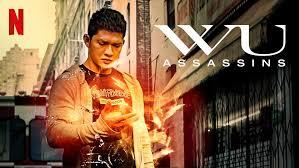
Wu Assassins a Netflix show that was released August 8, 2019, the first season received mostly positive reviews, even though there was some criticism in the plot, it was filled with impressive fight choreography, dance-like food preparation, with an eclectic flare between pop, hip-hop, and R&B. Now, I am not here to write a review, I wanted to discuss about how this show got some attention. What hooked people’s (and my) interest was, Netflix had posted a trailer, a scene from the seventh episode, Uncle Six and Kai Jin encounters a waitress in the diner of a roadside café. When the waitress asks if the two gentlemen want anything else, she offers that “the chef can do an Asian chicken thing” and some rice in the back instead of sausage and eggs like Uncle Six ordered. Uncle Six repeats that he is fine and thanks her, making it clear that it’s his final answer. The waitress responds to suit themselves, and she was trying to be nice because they’re “obviously not from around here”. Uncle Six replies, “Oregon.”, and the waitress looks at him up and down, and mentions “America”. Before the waitress leaves, Uncle Six stops her and goes into a literal history lecture about Chinese immigrants being exploited into building railroads. He quotes years, the Geary act, and amendments that explain why he and his son, Kai are just as American as she is, and that they’re going to stick with the eggs and sausages. This scene was satisfying to say the least, as I am an Asian American myself. The waitress was being polite, however she was also pushing some boundaries, and expressing a multitude of orientalist views. Orientalism surface level and/or stereotyped understanding/representation of a culture. Similar to Sejal Shah’sYes, there are a lot of martial arts scenes, but as you can see above, it's not the entirety of the show. The action is one of the big aspects of course, but it weaves Chinese mythology, culture, and traditions, into play. People argue about the Wu Assassins being a good show or not, but I believe all can say that the highlight of the show, was this scene.
-Ayaka O.
0 notes
Text
Hasan Minhaj
https://www.youtube.com/watch?v=i_FE78X-qdY Context/Background: I have been watching Hasan Minhajs's semi-educational stand up since he started on Netflix, I love the guy. All of the topics that he talks about are important to me and I always come out feeling better informed than when I went into it. I found this video while going through Youtube. Personal Impressions: I've always viewed this as a black and white issue. It never really occurred to me how the Asian American community fit into the mixture of it all. After watching the video it amkes sense. America isn't just filled with black people and white people but with all people, and all people have a stake in the way that our country is run, all people have agency. Connections to Our Class: In the video, Minhaj talks about how He personally has seen the reaction of his community to black culture. At one point he talks about how Bollywood stars use skin whitening products so that they don't look dark. This is extremely reminiscent to me of Good talk by Mira Jacob. One of the most heart breaking parts of the story to me was how she was told over and over and over again by her family that because she was dark that she wouldn't be as beautiful as her fair skinned family members.
Ryan K.
0 notes
Text
As a sophomore in my conservative town’s library, I was surprised to find a book titled “I Love Yous are for White People: A memoir” by Lac Su.
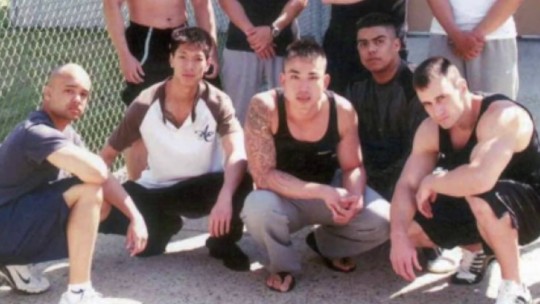
Leave it to the librarians to usher forward the hidden gems.
Being an impressionable high-schooler, the name immediately grabbed my attention, and its impact on me was huge in terms of my personal social awareness, because up until that point in my isolated life I only thought of racism in terms of discrimination against Mexican Americans and African Americans, with only things like To Kill A Mockingbird and historical speeches being my reference. I didn’t have any idea what the poverty and squalor in a large city could do to a family, how it could grind them down over time. I don’t want to give too much away because I’d like to encourage anyone reading this post to find a copy and read it themselves, luckily my memory of a book I read 6 years ago isn’t reliable enough for a heavy spoiler warning. The memoir is an account of Lac Su’s family moving from Vietnam to Los Angeles in 1979 and how growing up in the racist impoverished culture in LA, completely shook Lac Su’s idea of the american dream apart. While I’m sure my memory has managed to put most of the details of the plot and squalid conditions out of reach, I remember the community that Lac Su encountered; I remember the kindness from some in that community, but I remember the cruelty and abusive nature of his father following his diagnosis as well as the physical abuse that had accompanied punishment for years. In class we talk about belonging in Imaginary Homelands, I remember the lack of belonging that pushed Lac Su into joining a gang, and I remember the discriminatory conditions that stood in the way of his family realizing their idea of the american dream.
I wouldn’t say that I have any specific questions so much that I think it’s important to remember our history, full of injustice, and how those who were wronged have been either swept under the rug or into the grinder by the hand of history.
-Mitchell Treadway
0 notes
Text
Cultural Appropriation In Charlies Angels
This was something I previously brought up in a discussion board post, but I feel like it could be talked about more. The movie Charlies Angles mixes up cultures. The prime example is when Chinese and Japanese culture is intermixed, and not distinguished as being different Asian cultures. The prime example of this is when the girls dressed up in Geisha outfits, and then later on in the movie, Lucy Liu was dressed in a masseuse outfit. The image below portrays this.
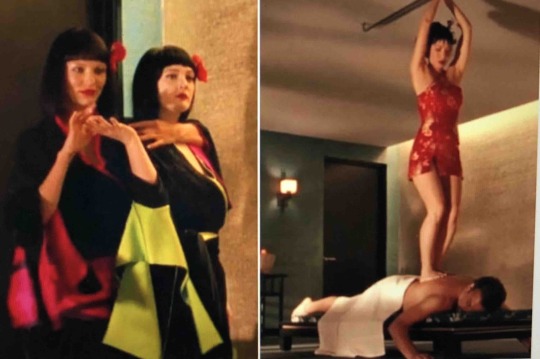
The two cultures are different, but were not given any distinction in the movie. The next example is when the girls dressed in belly dancing outfits, and completely appropriated India’s culture. This is in the image below.
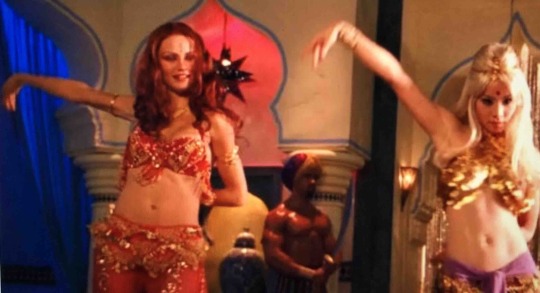
This movie came to mind when we talked about resisting ornamentalism. This idea of ornamentalism applied to this example because the focus was on the girls, not the clothing, they were treated as ornaments to be looked at. I thought about it further and did more research and they never once paid any attention to the different culture being represented, which is disrespectful. I think that the fact that the movie was so widely seen by people points to the fact that the audience was pretty big, which means a lot of people are engaging with the film. I think that portraying a culture like that is wrong, to not give credit, and to not distinguish between different Asian cultures is disrespectful, and helps spread to the audience that it is permissible to do that. When in reality it is not okay, and shouldn’t have been done. The question that arouse for me was, why hasn’t there been more articles written on this movie, and how it clearly appropriates Asian culture. I did research and found one article that was very blunt about what was going on. The other posts I found were just opinion pieces, not really a cohesive article about it. So I guess my question would be, why hasn’t more attention been brought to the film, and how it culturally appropriated Asian culture?
-Edith A.
0 notes
Photo
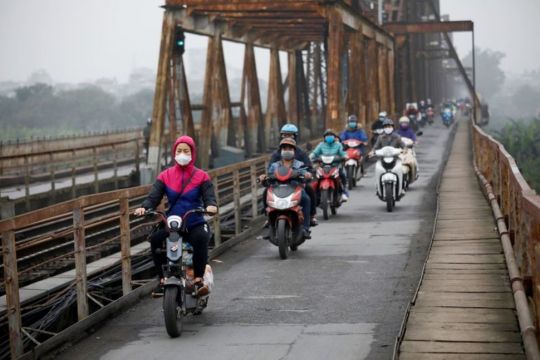
Vietnams Coronavirus Success
Throughout this quarter, coronavirus has changed everyone’s day to day life, from online classes to sheltering at home. I first came across this article from NPR by checking the recent news on coronavirus. The article, written by Michael Sullivan and published on April 16th, 2020 talks about how Vietnam has kept its COVID cases and deaths so low. What immediately caught my attention was how Vietnam managed to keep their cases below 300 (at the time of article) and not one death when they were neighbors to China. This was extremely surprising given the news of America passing upwards of 30,000 deaths at the time. Even more surprising was how we had “lessons to learn from Italy” and not lessons to learn from Vietnam or South Korea. Instead American news went on to spin a narrative about their cases being so low because they had dealt with many diseases, they lived under dictatorship, or their blind obedience to their government. This rhetoric reminded me of a combination of Yellow Peril and Orientalism. Monica Chui’s Filthy Fictions, though specifically focused on Asian American women, ties in well with the racist notions of Asian ‘uncleanliness’: “Asian Americans have been strapped with stereotypes delineating a body at odds with contemporary American culture, where dirt and attendant concepts of pollution, pathology, and sexuality have an analog in both “real” and literary histories, in Asian American belonging and displacement” (10). The visible and invisible concepts of dirt are still prevalent today, as we see Asian-Americans targeted during this pandemic as the “source” of its beginning when that connection is completely invalid. Vietnam has always been exoticized by Americans, and even as the entire world is in a global pandemic, they are still being viewed as an ‘other’, a group we have nothing to learn from. Their achievements in stopping the virus cannot be recognized because it would imply that we as a country are lesser.
https://www.npr.org/sections/coronavirus-live-updates/2020/04/16/835748673/in-vietnam-there-have-been-fewer-than-300-covid-19-cases-and-no-deaths-heres-why
- Ian LeCloux
0 notes
Text
When k-pop Stans attack
I found my content when surfing the social media platform Instagram, as my timeline is usually filled up with Korean pop related posts. These posts and reposts were made with in the last week and have very positive comments and reactions. The K-pop fandom and community is very widespread and I would say pretty powerful considering their accomplishments in the last few years. What caught my attention was the mention that a whitelivesmatter hashtag was trending and during this time with black lives matter protects and people mourning over the loss of innocent lives is immediately struck me as unbelievable that this racist hashtag was trending. It truly baffled me to how people are blatantly racist in 2020 and have achieved such a big platform to go viral with their ignorant and disgusting rhetoric. But imagine my surprise when the reason it was trending was people the K-pop community started spamming the hashtag with their favorite idols, completely filling its timelines with nothing to do with the original content. In solidarity, with the BLM movement, the fandom took it into there own hands to fight racists on social media by using the system against them because we all know none of those posts were gonna be taken down by the system itself. I believe this connects to our class because this became a form of radical social protest on a media site where it’s very hard to silence this hateful and violent rhetoric. When the Dallas police department asked for citizens to share videos of illegal activity during the protests to be able to make arrests and try and crackdown on rightfully angry participates of the protests the K-pop community strikes again using social media to their advantage by spamming the police app will more videos of idols until it had to be shut off for a couple of days. One more thing to mention is the support from the idols themselves to the BLM movement, BTS made a hefty donation of 1 million dollars to BLM organizations which was amazingly met with their fandom themselves raising 1 million to donate too.
https://www.cnn.com/2020/06/04/us/kpop-bts-blackpink-fans-black-lives-matter-trnd/index.html

Tess K.
0 notes
Text
Superman Smashes the Klan by Gene Luen Yang
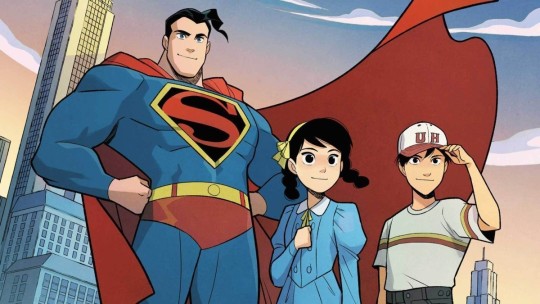

Gene Luen Yang released Superman Smashes the Klan, a Superman comic based on the 1946 radio series, back in the fall, where the main characters are Superman and Roberta Lee, an Asian American girl struggling to fit into the neighborhood. I haven’t had a chance to read this yet, but the premise of the comic, where Superman and Roberta work together to take on the Klan of the Fiery Kross, which is the equivalent of the Klu Klux Klan seems like a fantastic read with both an intriguing story and awesome looking art style.
This comic primarily deals with the struggle of fitting into the American society as an immigrant, both in the case of Roberta and Superman. That is a concept that I never thought about before; Superman is a prime example of an immigrant; he is from Krypton, a different planet altogether, and he has had to make a life for himself around a group of people that he may look like but is foreign to. This changed my perspective on how we see Superman in all the different media that he has shown up in over the years. The part that really resonated with me when realizing this is that even though Superman is an immigrant to Earth and America, there is no way to truly tell based on his appearance or biology. The only way someone would know he is an immigrant is if they were told he was. This idea ties back to American Born Chinese and Good Talk since both Jin and Mira are Americans, but people assumed based on their complexion that they were from another place.
Tom W.
Gene Luen Yang writing about Superman fighting the Fiery Kross (an equivalent of the KKK) is very informative about the KKK and what history teaches us. I did not know until reading this article that there was a western Klan on the West Coast (within three years of the KKK being founded in the South) that targeted Chinese Americans. Living in Washington my whole life and going to a school I had considered relatively unbiased (when it came to education), this came as a shock to me because I had never heard of that before. We had a large unit about Japanese internment camps, but what about the Chinese Americans living on the West Coast? They were also oppressed (and killed) for not being white. Bringing this to light I hope will start more conversations about the way our country was built using oppression to advance itself, especially with the Black Lives Matter movement going on today and all the Asian Americans standing in solidarity with them, because they too know what oppression is like.
Yang taking the original radio series of this Superman comic and changing the plot to make the Chinese American family central characters instead of just background characters is a fantastic thing, especially with what is going on today with the increase in racism toward Asian Americans due to the COVID-19 pandemic. Representation is a big thing in media these days, since there has been so few diverse representations in the past, and to coincidentally have Chinese Americans helping Superman in this new comic when the coronavirus pandemic happens? Let us hope people read this book and realize that Asian Americans are not sources of disease, but rather sources of goodness and humanity.
Hailee D.
https://www.dailynews.com/2020/05/29/superman-smashes-the-klan-author-says-story-about-racism-against-asian-americans-still-relevant/
0 notes
Text
Revisiting an Author : Bryan Lee O’Malley
Near the start of this course we were asked to write down Asian authors we had read or heard of before. I thought it might be interesting to return to an author I wrote down and look over his work again after having completed the course. I chose Bryan Lee O'Malley's comic Lost at Sea to discuss.

O'Malley is a 41 year old half Korean and half French Canadian author, musician, and cartoonist best known for his Scott Pilgrim series. Judging from the given information, I found it interesting that his first published work, Lost at Sea, featured a tall, blonde, 18 year old Canadian girl as its main character and narrator. Still, I noticed that some of the themes and motifs in the story drew parallels to other pieces we had read in our course.

Dehumanization is a big part of Orientalism, especially in the case of women. They are often objectified and thought of as nothing more than interesting exotic goods. They become nothing more than soulless things. This idea is reflected in Lost at Sea as one of the main driving points of the story. The main character, Raleigh, is on a road trip in America with acquaintances from her school and is trying to make sense of her messed up life, attributing much of it's disarray to her lack of a soul. Another idea I often saw was that immigrants coming to foreign lands would often become something else, something not entirely themselves. They too would lose their soul, being afraid to truly express their beliefs and loves and wants in a place that was opposed or wary of them. Here's another picture fitting the theme of dehumanization.

Lost at Sea often deals with the idea that there are happier memories waiting either ahead or behind you.

Raleigh didn't make many friends after her best friend had moved away long ago. On top of that, her parents divorced not too long after. Raleigh would try to think back to simpler, happier times when she felt very confused or anxious. Times when she would just mess around outside and enjoy the company of others. She would also look forward to meeting with her boyfriend, who was American and in a long distance relationship with her. Through all of life's struggles, memories and hopes are what kept her sane. We see this sort of idea conveyed in Carlos Bulosan's poem, If You Want to Know What We Are, and Le Thi Diem Thuy's The Gangster We Are All Looking For. Bulosan ends his poem on a message for hope, solidarity, and revolution after facing the brutality of hate and murder. Thuy wrote of pictures, memories, that the family kept and eventually lost as they bounced from home to home.

Towards the end, the story begins to develop a more communal feeling. As Raleigh begins opening up and venting about the complications in her life, she begins to grow closer to the classmates she is on the road trip with and eventually realizes that they lead their own similarly confused and messed up lives. She is not alone. This message of community is quite a ubiquitous one throughout most the pieces we have read in our course. Community is the phantom webwork stringing all walks of life together on the same path towards happiness. Raleigh doesn't find her soul, at least not yet, but she does find her own sort of happiness alongside this new community she's become a part of. She is still lost at sea, but now she isn't so afraid anymore.
Regardless of the fact that it was a white woman that embodied this story, I still believe there is much overlap with the material we read in our course that makes this piece relevant enough to post about.
I hope this made some sort of sense.
-Chase Tucker.
2 notes
·
View notes
Text
Scientists in America

In 2019, Nature magazine released an article detailing how the United States’ worry about foreign involvement into their affairs has been turning the lives of Asian American scientists upside down. The article, which is titled Chinese American scientists uneasy amid crackdown on foreign influence, caught my eye as I was doing research surrounding the strikes that are currently being staged to take place for individuals working in STEM fields.
This article beings to light many of these themes as it highlights Asian Americans being fired or asked to resign because of ties to China. Li Shihua and her husband Li Xiao-Jiang ran a lab together and said they have always disclosed where their funding came from, as per protocol. However they were both fired and the reasons cited were due to improper disclosure/non-disclosure of financial ties to China. They, like many others, wondered why this was never brought to their attention before the trade wars against China began through the Trump administration.
Carlos Bulosan’s poem What We Are shows how workers in America are generally treated, and though I once thought that we were getting better as a country about being more considerate, in these last four years I am led to believe that we have regressed to our colonial origins. This country is discounting the people who come to this country “reaching for the future, nourished in the heart” as Carlos Bulosan would say. He showed that migrants are “doctors, scientists, chemists discovering, eliminating disease and hunger and antagonisms; we are soldiers, navy-men, citizens guarding the imperishable will of man to live in grandeur.”.
I don’t know how to make this better. I don’t know how to bridge the racial lines in science fields. All I know is that science is a hunt for the truths of the universe, and that is universal. That hunt is one of non-biased integrity, and for there to be no overarching bias of country, ethnicity, gender, or anything else, we need diversity and we need co-operation across nations.
Alifaire N
1 note
·
View note
Text
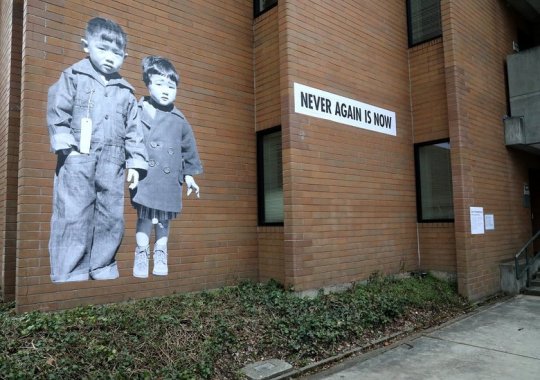
On February 20th, 2020, a mural at Bellevue College was defaced. This mural was of a photograph of two children who were detained at one of the Japanese Internment camps, and was created to commemorate the Day of Remembrance, which is the day FDR signed the order to intern Japanese Americans. Next to the mural was a plaque, explaining internment and its impact in Bellevue. On this plaque, a prominent Bellevue businessman was named as helping to lead anti-Japanese sentiment in the area. His children remain large donors to Bellevue College today. One of the Vice Presidents of the school whited out the section of the plaque naming this businessman, and then later replaced it with a copy of the plaque without the sentence. Both the President of the school and the VP were fired shortly after the incident. This incident exemplifies the sentiment of many white Americans, who want to forget that internment ever happened. Americans are ashamed of internment, and rightfully so. But instead of owning the past and apologizing for it, we try to downplay it. The businessman discussed in the plaque, Miller Freeman, became rich by buying up the land that used to be owned by Japanese Americans. His children continue to profit off of this land, which has become the Bellevue Square mall. The impacts of Japanese internment are still being felt today, whether Americans want to admit it or not.
I first heard about this incident because my dad is a professor at Bellevue College. As such, he was involved with the incident, as well as the decision of who would replace the President of the school. Bellevue College has named Gary Locke as Interim President of Bellevue College. Gary Locke was the 21st Governor of Washington State, and was the first Asian American governor in the continental United States. He also served several years as the US Ambassador to China. Hopefully, with the naming of Gary Locke as the Interim President, Bellevue College can begin to address Asian American issues from an informed perspective.
Jon F
0 notes
Text
Eugene Lee Yang

What I love about Eugene is his commitment to intersectionality and working against systems of hate and oppression. Recently, he told a story about being at the gym and coughing because he drank water the wrong way. He nearly got thrown out of the gym because people thought he had COVID-19, because he is Asian. In his videos, he dismantles stereotypes just by being himself, and he talks about that. He was a film major in college, he works in media and film and acting, he is gay, he does drag, he loves his dogs, he is Asian American. He is Eugene.
Many of us have probably seen or heard of the Try Guys, a group of best friends and YouTubers who try different things and make funny video out of it. They started as a show on Buzzfeed, then started their own production company, Second Try, out of one of the guys’ house. Eugene Lee Yang is known for being the edgy, cool, and quiet one out of the group. He is Korean American, gay, and likes dogs more than children. He is co-author of a book written by the Try Guys, called Hidden Power of F*cking Up, published June 18, 2019, and quickly became a New York Times Best Seller. He is known for his work with various human rights groups and LGBTQIA+ advocacy charities, such as the Trevor Project. Eugene advocates for equality, representation and diversity in his projects, tackling racial issues surrounding Asian American identity, and the lack of interest in casting Asian American men as audiences are exposed to desexualized secondary roles or comedic sidekicks. Many of the videos he did with Buzzfeed discuss race and being Asian American. For example, If Asians Said the Stuff White People Say and Awkward Moments Only Asians Understand and Asian Men Re-Create Iconic Underwear Ads, all highlight racial stereotypes and microaggressions experienced by Asians and Asian Americans. A number of the newer videos he has made with the Try Guys are LGBTQIA+-themed and discuss being a queer person of color and Asian American, and the representation of LGBTQIA+ people in media. Though he had referred to himself as queer previously, he came out as gay in a music video June 15, 2019, that fundraised over $120,000 for The Trevor Project.
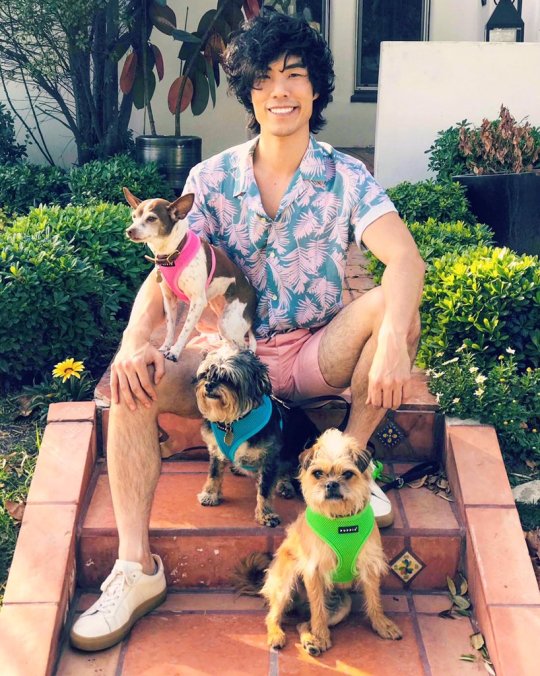
- Marysia S.
0 notes
Text
I read Ocean Vuong’s book On Earth We’re Briefly Gorgeous before I signed up for this class. I had heard about it, actually, on Tumblr, through pictures and text posts of bits and pieces of Vuong’s first book of poetry and this novel. It became very normal for me to see his words on my dashboard daily, from a whole host of different blogs, not just the literary ones. There’s something visceral and heartbreaking to his writing that strikes home with the general crowd of Tumblr, the very same people who have similarly connected with Richard Siken’s work, who Vuong also cites as an important influence. Vuong’s style of writing touches tender places, bruised places, inside of our hearts. There is no ignoring his words once you come across them.
He stirs up questions about home and family, about the Asian-American immigrant experience, and about queerness. I’m not Asian, but he still spoke to many things that I experience and think about. Thoughts about family, about coming out to them and living your life while trying to keep ahold of them are important to me. We’ve talked about family at length this quarter, especially when discussing Yanyi’s work, but Vuong is making me think about family almost as a “home” country. My family is the place I come from, but it is no longer the place I live. I have chosen a new country, because the old one became inhabitable. There comes a moment when Vuong is on the phone with his mother:
“I miss you more than I remember you,” (186).
Vuong has pulled all the strings together for me, thinking about chosen families and new countries and queerness as something that families may choose to use as the excuse for the boat they put you on to send you away from them. I have many questions and thoughts about these ideas, but mostly I’m thinking about how sometimes I think about my family as a homeland I can never return to, one that will become more imagined and less remembered day by day.
Audrey L
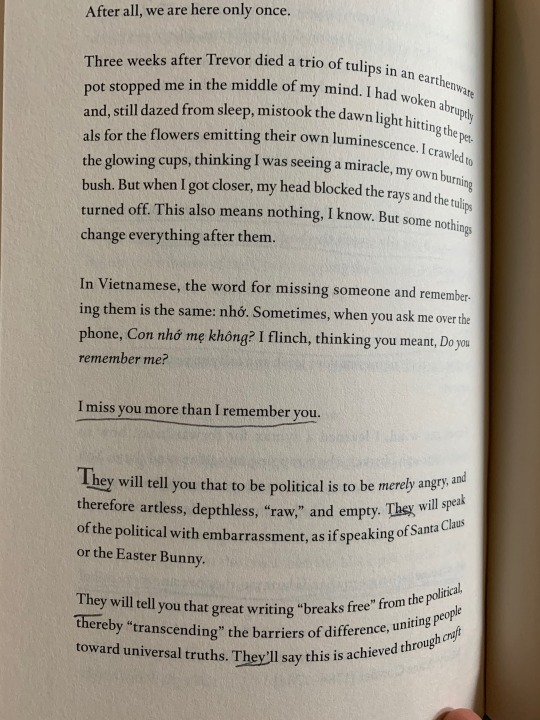
0 notes
Text
Recently, we have lost the lives of Breonna Taylor, Tony McDade, Ahmaud Arbery, and George Floyd. We all witnessed George Floyd’s death, and through his death one thing is very clear; we have to address Anti-Blackness. We have to address it in all of our communities. Many POC immigrants or families of POC immigrants might not understand how anti-blackness affects them. Or you may not understand how this topic relates to Asian-American literature. Before the Civil Rights Movement, we had highly racist immigration laws: the Chinese Exclusion Act (1882), the Immigration Act of 1917 (banned Asian, Mexican, and Mediterranean people), and the Immigration Act of 1924 (also known as the Asian Exclusion Act it banned “Arabs”, Asians, and Indians). But with the help of the Civil Rights Movement, and the advocacy of African-Americans the Immigration and Nationality Act of 1965 was passed. This law abolished the race-based immigration quota system and replaced it with a system that prioritized refugees, people with special skills, and people with family members in the United States. In addition, it forbade discrimination in the issuance of immigrant visas on the basis or race, sex, nationality, place of birth, or place of residence.
Without the activism of African-Americans, Asian-American literature would be where it is today. The work we read in this class (ENG 236) most of it or all of it takes place after 1965. As well as the story of Asian immigrants took place after 1965. With the few expectations are the poems from Angel Island, any work about the Chinese Exclusion Act, and Japanese internment camps.
In Monica Chiu’s Filthy Fictions, we learned that ideas of filth are racialized, sexualized and gendered. With these ideas of filth it leads to binaries that are problematic. For example, the idea of dirty v.s. clean. We all saw this play out when COVID-19 became a pandemic. As more fear kicked in, people were quick to blame the pandemic on Asians. These ideas of filth fuels Yellow Peril, creating images of “unclean foreigners”, “invasions”, and much more. White America has perpetuated these ideas to the point where some misguided people of POC and Black communities believe these stereotypes. Stereotypes where Asians are seen as harbingers of disease, Latinx folk are dangerous drug lords, and Middle Eastern/Muslims are terrorists. There is a lot of intersectionality in racial discrimination. Not to minimize the experience different communities face, but there’s a lot of similarity in our pain, scars, and trauma. In light of all the protesting, there are actions we have to take:
1. Fund and support groups that are trying to make a radical change. This looks like signing petitions to defund the police, or looking for justice for Breonna Taylor, and more. As well as, donating to organizations like Black Lives Matter, or to Legal/Bail funds for protesters and falsely incarcerated Black folk.
2. You can protest.
3. Do more research before you vote for someone. Try to find out if candidates are going to do something about qualified immunity, criminal injustice, and other systemic problems.
4. Address Anti-Blackness in our communities, families, friends, and most importantly in ourselves.
We both notice in our communities that the older generations tend to fall for the trap that is set by our oppressors to divide us. They believe these stereotypes created by White America, and it could be explained by fear. The fear of being the next victim, and the mentality of “if you can’t beat join them”, or it comes from the mentality many older immigrants have of “minding our own business”. This mentality comes from the fear of being deported, and all of these fears have an effect on Anti-Blackness in immigrant communities. Unlike the younger generation they don’t know American History like we do, and the role of the educator falls on our shoulders. What many of them forget is that we/they chose to come to the United States, while the ancestors of African-Americans were forced to come here. They were forced into slavery and to be brought/sold as cattle, and our Black brother and sisters (this is worldwide not just in the United States) have been/still are being killed. We are excited to see many old and younger Asian-American, Latin-American, and more joining together to support Black lives. Solidarity does not end with a protest, it's an everyday thing. Where we all make conscious choices for radical change to end qualified immunity and more. Action needs to happen everyday, where at the very least every single person addresses their own stereotypes and prejudices against Black folk.
Most importantly, we thank our African-American brother and sisters who fought for us in the 1960’s.
-Michelle Soi
-Kevin Alexander Estrada Alamo
P.S it’s important to note that the term POC, Black, and African-American are different. Although Black folk counts as POC, that term minimizes their experience. Black folk or Black people are terms to generalize people of African descent, While African-American specifically is about Black folk in the United States. Also enjoy this art that Michelle made emphasizing solidarity among POC and Black communities in the fight against racism.

0 notes
Text
Asian Enough? | David Huynh [TEDxVermilionStreet]
“We hired you because you are Asian. Be Asian!” “What does that even mean?”
The speaker of this TED Talk, David Huynh is a Vietnamese-American actor and model, and in this video he discusses the impact of a white dominated film industry on Asian-American actors like himself.
Mainstream media and film emphasize the “otherness” of Asian characters for comedic effect, objectify Asian women while making them seem exotic, and consistently white-wash characters that were originally Asian in the source material. Otherwise, it is quite rare for Asian-Americans to be cast for characters, at least on mainstream television. With prejudiced white views dominating the film industry, aspiring Asian-American actors are relegated to demeaning or over-sexualized roles that only perpetuate these ignorant stereotypes, as well as the same Ornamentalism as described by Anne Anlin Cheng.
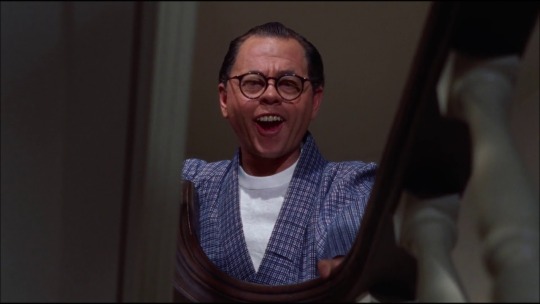
Regarding stereotypes for comedy, one of the examples he provides is the highly offensive character Mr. Yunioshi from Breakfast at Tiffany’s, who is often seen wearing a bathrobe while angrily grumbling about calling the police in fake broken English. Of course this depiction is quite outdated, but it is worth pointing out as an example of Asian stereotypes regardless.
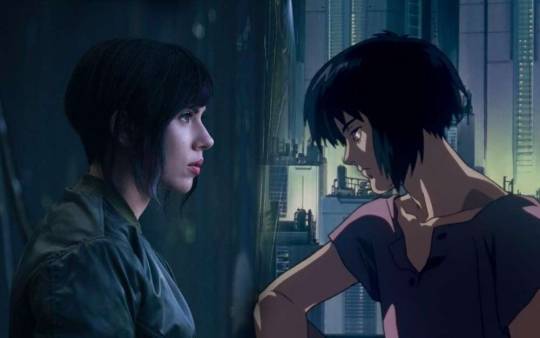
When the speaker discusses the prevalence of white-washing, he gives the examples of the Ghost in the Shell’s Motoko Kusanagi played by Scarlett Johansson, and the Ancient One from Doctor Strange played by Tilda Swinton. Both of course are white women playing the role of a Japanese law enforcement officer and a Tibetan Monk, respectively. The white casting of originally Asian characters in Hollywood is nothing new, yet it is disappointing (to say the least) that mainstream media continues to cast white women for roles intended for non-white characters. These actresses, as well as the directors ended up facing backlash online when these movies released.
The film industry has gradually become more welcoming of Asian-American representation in TV shows and movies. But despite these steps, there is a lot of progress yet to be done.
If you’d like to learn more about this topic, an article that further elaborates on the points introduced by David Huynh is “Why Do Asian-Americans Remain Largely Unseen in Film and Television?” by Thessaly La Force (nytimes.com/2018/11/06/t-magazine/asian-american-actors-representation.html), and I highly recommend the read if you want to learn more about the scarcity of Asian-American representation in film.
Link to TED Talk: https://youtu.be/wc-Mzf3ztcs
- Jaidyn Belmont
1 note
·
View note
Text
Recognizing Guilt in (Making) Art
By: Alex Perez
The act of writing is brave, because words hurt. Writing is loud and powerful, and it feels selfish. Anyone who creates art can feel it at one point. What we see and what we hear is too much to ignore. With an awareness of pain or distress then comes guilt. There are a lot of artists who cope with their guilt in their art to address feelings or events within their lives, and many Asian and Asian American artists have done such. Dealing with identity, family, homes, or even simple mistakes. Watching these artists overcome stress that stems from making art shows the true power they hold, because it is a laborious, revealing act.
When I think of rewriting the past, an artist I am constantly reminded of Hong Sang Soo, a Korean auteur, some may say. He has quietly been making films for two decades now, and with every project he makes comes another conversation about his life. Nothing is hidden in Hong’s films in terms of writing. His characters are extremely real, and because of such, one can easily start to map the trajectory of their behaviors and emotions, especially when taking the director’s own personal drama. In 2016, Hong was in the midst of an affair with actress Kim Min Hee (who he has worked on 7 of his past features) and word got out about him in Korea more than his work likely had at the time. His wife did not want to divorce him, which has caused a long legal case lasting for years, as only in June 2019 did the court rule that Hong’s wife has control over initiating a divorce, not him.
Over the past decade of his career, Hong has been writing deliberately about issues such as infidelity, going as far as to making these characters filmmakers and screenwriters, just like him. If it wasn’t already hard to ignore, two of his films from 2017 alone have covered the topic at hand. In On The Beach At Night Alone, the film explores a woman who once dated a married filmmaker- a dream sequence featuring a conversation where the woman scolds the man for trying to write a film about someone he used to love. In The Day After, a man is caught cheating by his wife, and he is so insecure and incapable of fixing his actions that he sleeps in his office instead of going home, which his wife continually texts him to do.
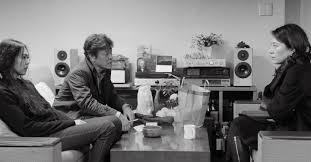
This fascinates me. There is nothing hidden beyond the surface of what Hong is writing, because it is all right there in his words and films. It is so blatant, honest, and in terms of what he admits to, it’s even pathetic, and yet I cannot take my eyes off of it. The type of meta-contextual work he does is something that is rarely found in American cinema. Here, many chauvinist male artists are writing about themselves while trying to remain like good men, without doing any of the work that comes with it. On the other side of the globe, Hong is making things very clear about himself, that being that he is often not a good person. He can be selfish, drunk, stupid, rude, and he won’t lie about it. The men in his films are never good people, and the women caught amongst their actions are smart enough to leave them. The Day After is a film where the male character has lost hope of an arc, so much that the female character overtakes him as the new lead by the 3rd act. There is rumor that in his latest film The Woman Who Ran the men aren’t even seen on screen.
As an artist making independent work like Hong does, one is in creative control. During the quarter, an artist we studied reminded me of Hong, and that was Mira Jacobs! While their subject matter is different, both of them have the upfront attitude in their work.
Good Talk is a memoir, where Mira Jacobs uses herself and her past to discuss her experiences of dealing with colorism and ornamentalism that still exists in the United States. Her work is daring, and loud in the way you don’t see many authors write. From conversations in the book alone, Jacobs feels guilty for even writing, one chapter featuring a line describing her work as “the stuff that no one pays for”. She’s blunt, and confrontational about herself as an artist. Some artists say using their children in their work is inappropriate, and yet Jacobs has modeled this book around conversations with her son, who is not at an age where he can comprehend the text. It’s a brave choice Jacobs owns. What an individual writes about is never to the needs of a large public. As far as getting paid to make art, someone like Mira Jacobs is important to someone like me, someone who wants to speak their truth into the world. Jacob’s work as a piece that needs to be read. Calling out racism and revealing personal traumas the way she does is enthralling, and worthy of support. The blindness she addresses has likely made its way to people who have committed such actions.
To people who study writing, film, and poetry, this is art. It’s not really a question. What I ask, however, is: Can art be labeled as such if it is simply a living truth? That sounds a little harsh. It could come from denial. In my own work, I disguise my personal conflicts with people regarding my transness into poems. It’s not wrong to do that, but it simply is me pointing a finger, and is what I point a finger at appropriate to be disguised in art? That’s where this thesis comes full circle. Artists find answers. Hong and Jacobs find answers. Their works are alive and in the midst of guilt, but they know how to shape it into something more than just a label. Art is too broad, it’s an abstraction not to be limited. It is beautiful and it is painful.
0 notes
Text
Aladdin and Orientalism

Aladdin is an animated film made in 1992 by Disney. The setting of Aladdin takes place in Agrabah, a fictious land heavily influenced by the story’s origin culture, Arabic. The story of Aladdin was taken from “One thousand and One Nights”, a collection of stories written in Arabic. Although a generation’s all-time favorite film, one of the first and lasting favorites for myself, several factors of the storyline and character details create an oriental image projected by Western ideas.
In one scene, when Princess Jasmine takes an apple from a market stall, the owner holds her arm down and raises a knife, preparing to cut her arm off for stealing from him despite her offer to repay him and suggestion for alternate payment. This action paints Arabic culture and people in an unfavorable light, almost barbaric and animalistic and dirty. It also contributes to the image of Aladdin himself. While the story is one of “rags to riches”, it shows him a lowly “street-rat” and treated inhumanely by police, the wealthy class, etc.
The opening song “Arabian Nights” had to change its original lyrics from “Where they cut off your ear if they don’t like your face” to “Where it’s flat and immense and the heat is intense” because it was offense to Arabian culture and people, furthered by protest from the American-Arab Anti-Discrimination Committee. These themes of barbarizing Arabian culture and people are an example of orientalism where Western perspective has inaccurately depicted the reality of a culture.
This also ties into the idea of “Yellow Peril”, illustrating Asians as less than human, as monsters or animals. For example, in Eugene Yang’s “American Born Chinese” graphic novel, the character of Chin-Kee is the epitome of yellow peril: yellow skin, buck teeth, exaggerated slanted eyes, slurred speech, and stereotypical Chinese clothes, among other things. Aladdin’s “yellow peril complex” is in the depiction of its characters: foreign/ exotic, dirty poor animals vs. rich beyond belief.
Where we can see the effects of ornamentalsim is in the depiction of Princess Jasmine. In a culture that is traditionally modest in clothing and appearance, the Western spin Disney gives her is far from accurate, maybe even insulting. Her outfit is revealing and sexualized, especially during the scenes where she is enslaved by Jafar, making her role ornamental.
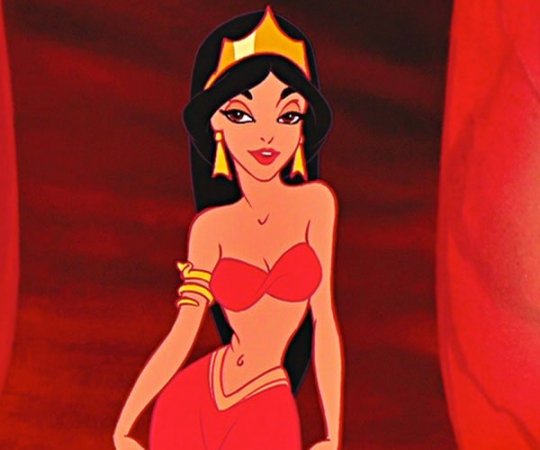
These examples portray Western ideology and perspective, romanticizing and dehumanizing the cultures and people from which they draw their stories from. Ideas of orientalism/ornamentalism, yellow peril, and general racism in the media strengthens the hold Western influence has on Asian/ Asian-American perspective. While Aladdin is not depicting Asian culture/ people, it does prove the point that we are fed Western images, far from the original reality, skewing our influence with false, imagined facts. In addition to Asian/ Asian-American orientalism, what other cultures do we see in the media being taken over and negatively affected by Western influence/ imagery? Because Aladdin is something many kids grow up watching, are we all taught to accept what we watch because it has been something that’s engraved in our mind since childhood (the depiction of Aladdin and the world it creates)? Is the media, especially Disney, doing better in the recent years of its filmmaking? Why or why not?
**I chose this idea because it really resonated with me since Aladdin is one of the first “Disney-princess” movies that I have ever watched. It’s also one of the first movies I actually stopped and thought about how inaccurate and inappropriate the depiction of its characters actually were. Where you can look at other Disney movies and automatically know what’s right and what’s wrong, many people I know seem to think that the depiction of Aladdin’s setting/ characters is not a problem, when clearly it is.
0 notes